Nick Offerman
Working with Wood, and the Meaning of Life
Nick Offerman has played many great characters, most famously Ron Swanson in Parks and Recreation, and he starred more recently in an astonishing episode of The Last of Us. But he is driven by passionate callings older and deeper than his public vocation as an actor and comedian. He works with wood, and he works with other people who work with their hands making beautiful, useful things. And this, it turns out, is also a primary source of his tethering in values. It’s a source of a spiritual thoughtfulness that runs through this conversation with Krista. So is his love and study of the farmer-poet Wendell Berry, whose audiobook The Need to Be Whole Nick just recorded.
This is a moving and edifying conversation that is also, not surprisingly, a lot of fun.
Guest
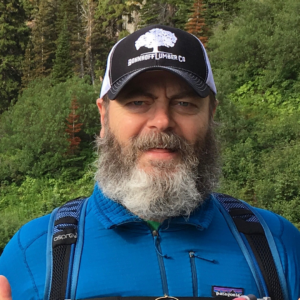
Nick Offerman grew up on a three-acre homestead "out in a cornfield" in Minooka, Illinois. His five books include Where the Deer and the Antelope Play and Good Clean Fun: Misadventures in Sawdust at Offerman Woodshop. He founded Offerman Woodshop in Los Angeles in 2001, a collective that creates hand-crafted items from spoons to canoes to ukuleles. He's also written a book with his wife, Megan Mullally, called The Greatest Love Story Ever Told, and they have a podcast called In Bed with Nick and Megan.
Transcript
Transcription by Alletta Cooper
Krista Tippett: Full disclosure: I wasn’t really a Parks and Recreation person, though lots of people around me were. Still, I have loved the actor Nick Offerman in roles large and small. He stars in an astonishing episode of the current HBO Series, The Last of Us. I’ve enjoyed how his many characters — whether macho or mild-mannered — often use big, juicy words with great panache, and even, it has seemed to me, with great care.
[music: Seven League Boots by Zoë Keating]
But what really compelled me to pursue the conversation that follows here is learning about Nick Offerman’s passionate callings that are older and deeper than his public vocation as an actor. He works with wood, and he works with other people who work with their hands making beautiful, useful things out of wood. And this, it turns out, is also a primary source of his tethering in values. And it’s a source of a spiritual thoughtfulness that I really enjoyed drawing out.
Nick Offerman’s five books include the delightful Good Clean Fun: Misadventures in Sawdust at Offerman Woodshop. And that’s a business he founded in Los Angeles in 2001, which has been his livelihood at times. It’s organized as a collective that creates hand-crafted items from spoons to canoes to ukuleles. They work with fallen trees from around urban L.A., as well as greater California and Oregon.
He also wrote winsomely about his love of the natural world and his reverence for the farmer-poet Wendell Berry — who we of course also love here at On Being. When we spoke, Nick had just just recorded the audiobook version of Wendell Berry’s 2022 book The Need to Be Whole.
I found this conversation edifying — that’s a word Nick and I both overuse at times. And I also found it, not surprisingly, a lot of fun. I hope you will too.
I’m Krista Tippett, and this is On Being.
Nick Offerman grew up on a three-acre homestead — as he says, out in a cornfield in Minooka, Illinois.
Krista Tippett: Well, Mr. Megan Mullally, welcome to On Being.
Nick Offerman: Thank you very kindly.
Tippett: [laughs] I should say that I’m reading your name beneath your Zoom box. I noticed that a lot of the interviews you did in the last year or so people took it as an occasion to walk in nature with you. So I’m sorry that we didn’t get to do that, but I’m glad we’re here in each other’s headphones.
Offerman: I am too, and let’s maybe take a rain check.
Tippett: [laughs] Okay, I would like that. Nick, I don’t think I’m going to ask you this question I often ask — if there was a religious or spiritual background to your childhood — because I heard you tell the wonderful Ezra Klein, basically, that you were an unmoved altar boy. So that’s fine. But what I thought, the way I thought I might rephrase the question is: how would you describe the roots of impulses and insights that animate you now, that I would call spiritual in the most expansive sense of the word, your spiritual and ethical and moral foundations? How would you start to locate that, what your childhood imparted?
Offerman: Well, I definitely am picking up what you’re putting down. I feel like my true spirituality, or the roots of my values, or my sense of morality were occluded for a lot of my childhood by conventional, sort of Western spirituality. The people telling me what should be, I should find sacrosanct — I was like, “You’re putting me to sleep. I would like to be out in the woods, please.” And years later, the penny dropped and I said, “Oh, that’s because that’s what I find holy.” And so only in hindsight — I had a wonderful family on both sides. My mom and dad, everybody came from an agricultural background. Many of them are still pursuing their livelihoods in agriculture. And so being outdoors and doing simple, honest labor with my family — whether it was working on my family’s farm, on my mom’s side, or learning to use tools, or working in the kitchen, or housekeeping, or weeding the garden, or you name it — I mean they were composting before you could buy composting bins in SkyMall catalog. And so looking back on it that’s what stuck with me. Thank goodness. [laughs]
Tippett: Your most recent book is Where the Deer and the Antelope Play, and I’ve read that, but I also, in getting ready to talk to you — I’m interested in the whole sweep of your meanderings and writing and thinking and living. And I also just really loved your first two books, I think, Paddle Your Own Canoe and Good Clean Fun. I will say we also got the book you wrote with your wife, and my daughter absconded with it. [laughs] So I did not get a chance to look at that, but I have no doubt that your wife, Megan Mullally, will find an honorable mention, as will marriage, in this interview.
But I really want to kind of spend some time with — and you just touched on it — this like working with your hands and using tools. It seems like by trade you’ve been a woodworker almost as much as you’ve been an actor, and that certainly you started working with your hands very early in your life before you were an actor.
Offerman: That’s true. I just gravitated, I guess. We were all taught to do all the chores. And I wanted to be out in the field, or out in the vehicles, with grandpa and my uncles. And my dad would work part-time on the farm. And so being around there, you learn to use a mechanic’s tools and some small carpentry. And over the years we planted hundreds of trees. My folks had a huge garden. We built a couple outbuildings. And so as I grew, my dad would let me and my siblings help more and more, and everybody kind of had their strengths. And mine was, eventually, to be able to hammer a nail using only one nail.
Tippett: [laughs] Okay, good. And it was interesting to me that even when you — okay, so you were growing up in the ‘70s and ‘80s in this small town in Illinois. You went to the University of Illinois, you studied theater. But even when you were first doing theater in Chicago in the mid-90s, you were sometimes also working as a master carpenter on the set, right?
Offerman: Yeah.
Tippett: And then in L.A., say you were sometimes making part of your living between TV and film gigs building decks and cabins for houses in the hills.
Offerman: Yeah, really all the way through my twenties, I made probably, I don’t know, 85 percent of my living as a carpenter of one sort or another. My acting career was a very slowly rolling snowball, so it was still kind of fist-sized by the time I turned 30. So I was getting sporadic work. I’d get a nice guest star job on an episode of ER, and that one week’s paycheck would be worth like three months of carpentry. And so you’d hit these oases every three or six months, and then you’d go back to work swinging a hammer until the next Clooney vehicle came along.
Tippett: [laughs] And would you also talk about your teacher, your spiritual teacher, Shozo Sato, who you met when he taught you Kabuki theater? And you also credit him with leading you to this woodworking discipline.
Offerman: Absolutely. I met a cool friend in college named Joe Faust, and he was one of the curators of my life. I’ve always relied on these much more acculturated friends, and then finally, my magnificent bride, to tell me what books are good and what music is good. And so Joe Faust said, “Hey, next year, we should sign up for this Kabuki theater class.” And I said, “Okay, Joe, thank you.” And we did.
And it turned out that I just had a skill set — I could carry heavy things and use tools — that made me valuable to our sensei, Shozo Sato, who he’s a juggernaut of American theater. He would take Shakespeare plays and Greek plays and put them on in a fully traditional Kabuki style, traditional Japanese theater style, which just had such a profound effectiveness in sort of the pastiche of humanity. Our biggest hit show was in the early nineties. It was The Iliad on stage called “Kabuki Achilles.” And it was an anti-war show. The message of which, when Achilles kills his ultimate enemy, Hector, they grasp hands and he says basically, “Why are we doing this? You are as I. We are the same.”
And so, this farm kid — suddenly I was touring Japan and touring Hungary and Cypress. And working for Shozo — carrying, just being his helper in the garden and around the house. And he would pass along little Zen kōans and little sayings. The most effective one in my life was, “always maintain the attitude of a student.” And at the time, I was his student in college and I thought, “Well, that seems not that…”
Tippett: It was very literal.
Offerman: “…effective of a thing to say.” That’s no problem. I’m paying tuition in fact. We still are very good friends. He married Megan and I with a tea ceremony. And so over the years, I continued to sort of parse the meaning of every gesture I’ve ever witnessed from him because they always continue to unfold. And as I grow and I’ve learned how to tie both my right and left shoes, the meaning becomes clear to me. And “maintain the attitude of a student” just means understand our human fallibility, understand that we’re never done learning and that turns you to face our ignorance. And to me that leads to joy. Like, oh, I’ll never be done reading books. I’ll never be done making better boats or furniture or trying to be a good husband or family member. And on and on and on. And once you grasp that, you can have a very happy life.
Tippett: Here’s a lovely way that you wrote about this lesson, “always maintain the attitude of student,” in your book Paddle Your Own Canoe. Was this your first book?
Offerman: It was.
Tippett: This is a lovely autobiographical, your story.
Offerman: Thank you.
Tippett: So, you wrote, “My favorite rule from Sensei was always maintain the attitude of a student.”
And then you wrote, “When a person thinks they have finished learning, that is when bitterness and disappointment can set in, as that person will wake up every day wondering when someone is going to throw a parade in their honor for being so smart. As human beings, we, by the definition of our very natures, can never be perfect. This means that as long as we are alive and kicking, we can be improving ourselves. No matter our age, if we always have a project to which we can apply ourselves, then we will wake up every day with an objective, something productive to get done. This allows us to go to bed at night in the peaceful knowledge that we have done some good, gained some achievement, however small.”
And then you said, “Having ears for this lesson has been one of the luckiest pieces of listening I’ve done because it has led to my woodworking discipline one of the greatest joys of my life.”
And I just feel like you learn so much about life through woodworking. Whenever you perform as a humorist you encourage the audience to find something to make with their hands. What’s that about?
Offerman: Well, again, we get back down and eventually I know — Look, if we’re going to become friends, I’ve set a record: this is the longest I’ve ever talked to somebody without bringing up Wendell Berry. [laughs]
Tippett: [laughs] Well, okay. Rest assured, I will take you to Wendall Berry if we don’t get there, but we can go there whenever you want.
Offerman: As far as I’m concerned, if it ain’t broke, don’t fix it. So the wonderful Kentucky agrarian, who you have featured on this program before, is another just one of my great teachers. I’m a huge fan and student of his writing. And it all comes down to this sensibility of learning the value of what I could do with my hands, which in my case was generally make things out of wood, although I also love — I can sew clothing, I love to cook. I love to give massages. There’s a lot of things that I love to do with my hands, but let’s just say the best is woodworking. What I realized was by finding that, finding this organic vocation: that’s my gift. With the tools that I have been given, I can make you a really nice table and chair or a canoe or a musical instrument from which we can all profit.
And this is, to me, that is like the seat of holiness and humanity. I think we all have this set of gifts. I think everybody has something that they can make with their body. The most obsessive accountant who says, “No, no, no, I’m only obsessed with the abacus and keeping the accounts. I can never make anything with my hands.” I still say if everybody could try everything you’ll find something that you excel at. And maybe it’s not as tangible, we have to think outside the box. Maybe it’s child-rearing or maybe your hugs are so incredible that you should work at a senior citizen’s home and just be the hug wizard.
Whatever it is, I think that everyone has something that they can do. And it gets to the heart of what is right and wrong, I think, about our civilization, which is our industrial consumerism sells us the idea that we should ignore our bodies. We should ignore the parts of us that are Mother Nature. We should purchase satisfaction. We should purchase goods. You know, we should consume. We shouldn’t create.
[music: Leptias by Blue Dot Sessions]
Tippett: And all those examples you gave including, especially, the woodworking, it’s where the brain and the body are having to coordinate. And there’s this line that Wendell Berry that you quote, “that the mind that is not baffled is not employed.” And I love the way you talk about how woodworking presents these puzzles that just engage and stretch a person in a very joyful and kind of life-giving way.
Offerman: That’s it. I love a puzzle. My wife and I love doing jigsaw puzzles, but we also just love mind teasers. We love, you know, doing the New York Times Spelling Bee. It’s a touchstone for us where we compare notes and we shake our fists at the tidbits that we missed. Yesterday the word was “tidbit” and we were very mad to have missed it.
Tippett: It was literally “tidbit” yesterday?
Offerman: That’s right, which I think there’s no spoiler in that. A few days ago I missed the word “idiotic,” which seemed pretty appropriate. But for me, I love to be engaged and I love to be curious because I’m 52 years old and I’ve been athletic and strong for my whole life, and I’m very grateful for those gifts. But the entropy is upon me. My joints are complaining. I have a herniated disc. And so as I realize, okay, I’ve got to slow down, I got to slow down a step and I’m heading into whatever this next phase of my life, I’m so grateful. I’m ravenous for the things that keep me curious and engaged.
And so instead of my wife and I sitting around and becoming bored with each other. And then what? Sniping at each other and resenting each other. We say, “What puzzle can we turn our attention to?”
In fact, and this is a huge tip, that I think goes very well with the vibe of On Being: One of the greatest things we’ve learned to do as a couple, just in terms of fruitfully spending time together is doing a big jigsaw puzzle and sometimes depending on the puzzle — and you learn how you work together — sometimes we’ll do two puzzles so that there’s no boundary issues. And then while you’re doing the puzzles, listen to audiobooks.
Tippett: Okay, wait, hang on. So each of you is doing your own puzzle or you’re doing two puzzles together?
Offerman: Either way. We’ve done it both ways. We’ve only recently discovered the stress-free edition of the two-puzzle system. So, get on the dining table, each set up your own puzzle, and then listen to an audiobook, and it all locks together in a very alchemical way that’s quite gratifying.
Tippett: [laughs] Okay. And something else, you at age 38, Ron Swanson was born. You had this starring role in Parks and Recreation, and that’s what many people came to know you for, that role. And in some ways, that gave you — not just that role, but there’s this — Oh, there was an article about you in Men’s Health, and they say to you, “you’re synonymous with being a man’s man.” Ezra Klein said you have this camp masculinity. And absolutely this woodworking idea, I think, on the surface feeds into that. It looks so compatible, it looks like part of the shtick. But you’ve trained — it looks like women are running your — the Offerman Woodshop?
Offerman: Yeah. That’s correct. I mean, it’s weird. And so when people accuse me of masculinity or machismo, I say, “I understand superficially what you’re seeing and hearing. I get the package, but please rest assured that I’m a giggly [laughs] kid inside this beefy lumberjack.”
And so immediately with Ron Swanson — it was interesting, a lot of different parts of the fan base sort of selectively cherry-pick parts of Ron. People would sort of lay this John Wayne, sort of pugilistic idea of masculinity on me. And I would say, “Why do we have to genderize it?” I think as we are evolving, especially in the field of gender, let’s continue to erode these sensibilities. Because when people will say, “Oh, you’re a woodworker? So, like in the garage tools, dad kind of stuff?” And I would say, “Well, no.” I know what people are saying when they accuse me of being manly, but I say, “Thank you, but please, I hope you never see my older sister Laurie can wilt me with a glance.” [laughs] There’s power and then there’s power.
Tippett: So you said a minute ago, you kind of collect and look for curators — people who help curate life. But I think teachers and friends: this is really important to you. And it feels to me like your friendships, that you invest in these things. You invest in following what you learn from people who you consider to be your teachers, and you invest in friendship.
And — oh in Paddle Your Canoe, you wrote that, “Without teachers in our lives, we would be a bunch of sorry dullards, indeed. Dimwits and dunces.” So, this is where I start to invite you to talk about your teacher and friend, Wendell Berry, who feels very special in your pantheon of curators of life.
Offerman: Oh, boy. Well thank you, that’s true. I could really go on a long time. I’ll try and be nutshell-y. In the mid-90s, I was doing a production of Sam Shepard’s Buried Child, his Pulitzer Prize-winning, incredible play at the Steppenwolf Theater in Chicago. And there was a wonderful actor in the show named Leo Burmester, who’s no longer with us. But he was from Kentucky and we became friends. And he’s a big, loud, wonderful character. He is a gentleman and a boor all at the same time. And Leo Burmester saw something in me, and gave me a book of Wendell Berry short stories and said, “I think you will like these.” And I’m literally welling up. It was so — it so profoundly affected my life. And I never got — I never saw him again. I never—
Tippett: Oh, gosh.
Offerman: Years went by. I think he was based in New York. But it was several years before I understood what this work meant to me. But I read these stories, and I just was knocked flat by, first and foremost, the reverence with which Wendell paints with which he paints regular people, which is my family.
I have this incredible, big family and everybody except the jackass you’re talking to is — Here are the jobs of my whole family in Minooka: three librarians, two school teachers, farmers out the wazoo, paramedic, craft beer [laughs] craft brewer. I think that’s everybody. A couple people work in the administration for a seed corn company. But, by and large, it’s a family of people who give their lives in service. They’re humble, they’re generous. I hold them in such high regard. And here I am reading this fiction, and I’m aspiring to sort of get away from there. Something about the conservative small town made me say: ah, there’s a lot of what’s great about humans here, but there’s also — as I go through adolescence, I’m realizing there’s also a lot of prejudice.
And so, as I lived in bigger and bigger cities because that’s where the theater is, I suddenly — I went through this shift when I read these Wendell Berry stories where I realized, “Oh, I have so much more value than I ever realized because of my family and because of where I come from.”
Tippett: Yeah, I’m also — I’m a small-town Oklahoma person too. I think that impulse is very — Well that’s part of the human story, right?
Offerman: It is, it makes sense. And that — it’s very important that we sort of voice that because that’s at the heart of what Wendell’s putting across. And what he began to teach me — and he still hasn’t finished — is that I was attracted to the same shiny, bright lights and big city, whether that’s literal or figurative, that all of civilization is, which has allowed us to take a wrong, a very bad, wrong turn, around the industrial revolution. And with his fiction and his essays and his poetry, he just speaks so patiently and eloquently.
And if he was here, I always feel his eyes on me. I would also say — and he’s grumpy and he should be. He’s fallible. But the overweening, the theme of his work, just really punched me in the gut because of the availability — like my parents had instilled in me the proper channels for Wendell’s message to reach me.
And so, I wrote him a letter basically [laughs] asking him if I could adapt some of his work. And he said — and he wrote me back and he said, “I like you and I like your letter. The answer is no.” And we continued to correspond over the years. And 20 years later, in maybe 2015 or so, friends, finally, put me together with a great documentary filmmaker named Laura Dunn. And she was making a documentary about Wendell and his vision. And she was having some difficulty because Wendell and his wife, Tanya, had agreed to the documentary. They agreed to participate [laughs] in a movie about him, and he said, “Well, I will cooperate as long as I don’t have to appear in the movie.”
Tippett: Yeah, I was going to say, they are very private and guarded. So here’s something you said. So just to pull through what you were just talking about, about how it shifted the way you saw your childhood and the world really, that somehow you went from thinking in terms of having a bucolic upbringing to finding roots of an agrarian sensibility that he helped you start to value. Does that sound right or am I paraphrasing?
Offerman: No, that’s very — that’s very good.
Tippett: And what does that mean to you? What is that transition?
Offerman: Well, what it means is — it’s something that he’ll be the first to say: as soon as you flip a light switch, we’re all complicit. We’re sold a lifestyle that tells us: you don’t have to be frugal. You don’t have to pay attention to your neighbors. All you have to do is, if you have one of these phones, you just hit a button and they’ll bring you your food and then they’ll take away your waste. And so for me, it’s a constant wrestling match. I just did the audiobook for Wendell’s…
Tippett: Yes, I know.
Offerman: …his incredible new book, called The Need to Be Whole. And it’s so — it’s one of the hardest things I’ve ever had to do because, first of all, Wendell is a very scholarly and erudite writer. And just to deliver his paragraphs cogently to a listener is really hard. [laughs]
Tippett: Yeah, I can see that. I can imagine that.
Offerman: Not only that, but you have to turn off the voice in your head where he’s laying down this deep wisdom and you’re thinking: oh my God — just thinking about the combustible engine that I drove to get here today, and the air conditioning that I’m sitting in, and so forth and so on.
And so what I determined once I — I got involved with producing that documentary called Look & See, and it’s wonderful. It’s beautiful. I’m so grateful to be part of it. And a fun Easter egg is that I do appear in the movie, but only my hands and tools making a three-legged stool.
Tippett: The Berry Stool?
Offerman: That’s right. That’s why it’s called the Berry Stool.
Tippett: That’s so beautiful.
Offerman: Thank you. And I sincerely think that may be the pinnacle of my career — getting to — for an audience to see my hands making a stool while Wendell talks about it. I’m ready to retire after that.
Tippett: Were you able to choose some passages of Wendell Berry’s writing that have been really formative for you? And I understand the challenge of that, I really do. Especially because you’re so steeped in the fullness of his work.
Offerman: Well, I can’t think about it too hard. What I do is think — I pretend we’re sitting on my bedroom floor and we’re 12 and I’m playing you my records.
Tippett: Okay, good. Play me your records.
Offerman: And I’m like, you haven’t heard the Monkees? Are you crazy? Check this out. And so the first thing I’ll do because I’m not going to read you any of his fiction is give your listeners a pitch for his fiction. Start with some short stories. There’s a book called Watch With Me. There’s a book called Fidelity. But here’s the thing, all of his fiction, of which there’s, I’m guessing eight novels and 40 short stories, something like that — it’s all one massive pastiche. It’s a mural painted across the entire sky of this fictional riverside town called Port William in Kentucky. I hope one day to maybe adapt some of it. And if I do, I hope I do it in a way — he openly says, “I approve of you. I think your heart is in the right place. Wait till I’m dead.” [laughs]
Tippett: Okay. [laughs] Right.
Offerman: But so for me as a storyteller, it’s his fiction — that’s what drew me in. I would, I’d start off with a few lines from — there’s a poem. It’s a little long. Called “Manifesto: The Mad Farmer Liberation Front.” And it’s just wonderful. I have a wonderful letterpress version of it hanging in the bathroom at the shop. But here’s just a few lines that delight me. “Laugh. / Laughter is immeasurable. Be joyful / though you have considered all the facts.”
And then: “As soon as the generals and the politicos / can predict the motions of your mind, / lose it. Leave it as a sign / to mark the false trail, the way / you didn’t go. Be like the fox / who makes more tracks than necessary, / some in the wrong direction.”
I love those instructions, and I just — if nothing else as a Mary Oliver’s instructional, “Be joyful / though you have considered all the facts.” [laughs]
Tippett: Yes. [laughs]
Offerman: It is so good because that’s the human condition. But he is somewhere else, like, we owe it to the universe to be joyful because we’re capable of it. Because we can, we ought to do that.
And then one other tidbit. This is such a great quote, and this ties him to Aldo Leopold, who is also very prevalent in my last book. He’s another heroic American agrarian who ended up at the University of Wisconsin at Madison. And he was really instrumental in shaping a lot of Wendell’s thinking. It was Aldo Leopold who just looked around him and said: wait a second, we’re not separate from nature. Whatever our ecosystem is, wherever we live, even at the top of a skyscraper in Manhattan, we’re in nature. We’re part of this ecosystem. And then this quote from Wendell comes into play. “Whether we, and our politicians know it or not, Nature is party to all our deals and decisions, and she has more votes, a longer memory, and a sterner sense of justice than we do.”
And that’s the thing that my mom and dad instilled in me — and I’m not wise, and I’m not as responsible as I would like to be, I’m not as prudent as I would like to be — but they put it in me so that I have — it’s that feeling of when you’re out at a dinner and some rich acquaintance is there, and you have that, and you’re broke and you’re like, “Are they picking up dinner? Like am I going to have to, am I going to have to pony up the $17 in my pocket and is this going to be embarrassing?” That’s what we’re doing. That’s what our society’s doing, is we’re running up the bill and at some point the meal’s going to end. They’re going to run out of bread in the kitchen, and someone’s going to give us the tab, and we’re going to say, “Oh shit, we forgot we have to pay.”
[music: Our Quiet Company by Blue Dot Sessions]
Tippett: Okay, Wendell Berry is in the middle of this conversation. He will remain here. I do want to say, this is turning a corner a little bit. You’re very humble, and I appreciate that. And it’s real. And I just want to say, one of the things I appreciate the most about you, and it comes through in a lot of the characters you play as well, and it makes me wonder if the characters were already written that way, or because you’re playing the role they’re written that way. But you really use words. You value words, and you value words that are not often thrown into casual American sentences, which are usually way too casual for my taste and just in general. And when I was thinking about the adjectives I would use for the way you use words, I was thinking about — you use words that are, I found I was using all these food words, right? Like meaty, or delicious, or a mouthful. So I don’t know what that’s about. That’s interesting.
But I love the way you use the word edifying, which is one of my favorite words. Or “engendering mirth.” Or in the Good Clean Fun book, the setting up the shop chapter, the kind of subtitle is: “this is one of the most titillating steps in a woodworking practice, not to mention one of the easiest to accomplish.” I just want to know where that comes from in you. Have you always been like that? In my mind, not always, but ideally, there can be a real connection between taking great care with the words we use, and taking great care with how we’re living.
Offerman: Boy. The reason you have a massively popular NPR show and podcast is because you’re very astute, and thoughtful. And you hit a very lovely nail on the head, specifically in that, Wendell writes very beautifully about this subject, about that if we don’t treat our language with affection, how can we treat our communication or those with whom we engage our…
Tippett: With whom we share our life, right?
Offerman: Yeah, we share our lives, who we communicate, and also the actions, what we do, how we describe the world, how we describe what we’re going to do to the world. It’s sort of Mad Men — You’ve complimented me and now I’m tongue-tied. It’s, it’s a — oh hell.
In the world of Mad Men and advertising it’s de rigueur that you come up with language that is elusive, and that is cloaking. And in the world of nature and her economy, the more honest we can be, I think the more beautiful our language is.
But to answer your question, it’s a weird — thinking back on it, which I haven’t really been asked this, I’m thinking of the scenic carpenters that were my friends in Chicago. I remember making them laugh. I have always loved reading. My aunt was the first librarian, my Aunt Mickey, and she gave me The Lord of the Rings, and she gave me The Chronicles of Narnia, and set me off on a world of reading, and reading comprehension, and wanting to communicate stories to others.
And so I remember with my friends, even in Chicago, I’d read a book and something would just strike me. I’d love the way Robert Anton Wilson used this phrase. And then I would try it out the next day, and sort of add it to my — put it in my quiver. And the thing is, I never dreamed that I would become a writer of books. But when I did, when I had the opportunity, I said, “Holy cow, I really want to.” I love compiling language, and thought, and participating in this vast conversation. And I happen to have some really great teachers that I can try and pass along to you all.
But it’s a tricky thing because I don’t ever want to come across as showy, or somehow brandishing a vocabulary. But instead, I make mistakes. And I have to credit my wife, who was an English major at Northwestern. She even today — she corrects me all the time. So there’s a real student-teacher relationship in a lot of ways that I’m grateful for.
And so it’s one of the ways in which I’m open and curious. I continue to try to learn new words because I think our language is beautiful. And like hand skills, it’s one of the things that are being allowed to atrophy in our civilization, and I want to go the other direction. I want it to continue to blossom. And I want people to learn better ways to use chisels instead of ask me, “What is a chisel?”
Tippett: And the other thing is using unexpected words, uncommon words, it opens a space of possibility. It shakes you out of — it makes you think. That’s always good for us to be made to think. It’s that little puzzle thing that you mentioned. It’s good for us.
Offerman: One hundred percent.
Tippett: And you also use words, and you don’t just use these words. I can’t remember where I got this. It may have been from your blog: decency, humility, kindness, generosity, honor. Fidelity is another one you use a lot. And those are muscular words. Those words connote something important. And they’re easy to use in a hollow way, and they do get used in hollow ways. But when they’re used with integrity, with intentionality, they shift things in us. And I want to point out that when you note those kinds of things, the words, but the things behind them as important to you, you say — again, I don’t know where I got this — “And I aspire to embody them in life. Once in a while, I succeed in doing so. Usually, I do not.” So they’re not boasting, they’re aspirational. But they’re meaningful.
Offerman: They are. And that’s why I’m so grateful that I have the ears and the eyes to take that in. Because I will always fail, ultimately, at being generous — like I have this wonderful big family, and I wish I wrote them all a letter once a week, for example. But I rarely — like I fail hugely at that desire.
And I’m just going to grab one example, and that is the word “fidelity.” It all is part of this set of values that attached — When Wendell first struck me, like a thunderclap, it was because his writing said to me: I’m writing some gorgeous stuff about your family. And the first story that I asked him if I could adapt, and I still would love to, is called Fidelity. And it was then, specifically, with that word and that value that I said — that was my way into him. And what he’s talking about, specifically, with fidelity, in a modern sense, it brings to mind a marriage. And are you true in your monogamous relationship, is how I connote that most strongly. But what he’s talking about is: Who and what are you loyal to? Who do you care about? Who is in your neighborhood? And that includes people and animals and rocks, and grass and air.
And that story made me pay attention to that word, “fidelity.” And it made me say, okay, what — I’m a dancing jester. I travel the world and like sing and dance for people in different ways, in different arenas. You know it used to bum me out. My family are such prolific gardeners, and that’s one of the first — when people say, “What are we supposed to do? What’s your solution?” I say, “Well, grow some food. Or find out who’s growing your food and care about that.” I can no longer be blithely blind to: where did this burger come from?
Tippett: Something that just strikes me about this evolution, I would say, that you’ve made — you started out being somebody who loves the outdoors, loves the natural world, loves working with your hands. Your family had a reverence for that. But the evolution has been in just deepening that understanding of all of this and your existence, and our existence. The fact that we keep — for me it’s understanding that we are not in the natural world, but of it. And that we don’t, we are not whole without its wholeness and health. And I feel like this move you’ve made is a trajectory that a lot of us are on. Even just what you talked about, so you’ve gotten to this point where it affects the way you look at a hamburger, but that’s decades of getting more and more granular about this.
And then at the same time, we are living in this world that on the one hand is waking up to this in parts, in places, in ways, and then it’s structured to take our attention away from it. It’s a world of working with our thumbs, right? Not with our hands. So I don’t know, how do you — So I just place that great paradox before you, maybe this is what we’ve been talking about the whole time.
Offerman: Well it occurs to me to finish a thread from my last answer that will kind of lead into this answer, which is: I’m facing this dilemma as you speak of. And my family are these incredible gardeners, and I live an itinerant life. My house is in Los Angeles, but I am out of town a lot, working on location or on tour as an entertainer or an author. And so I’m like, “Boy, I’m so full of it. I’m, listen — I’d love to grow some brussels sprouts, but I’ve got to go jump on another airplane.”
Tippett: You’re right, and I think a lot of us have our version of that.
Offerman: And sure. And to scale that up or down. But for me, what saved me, or what is my salve, is that I said, “Oh, hang on. I’ve got this woodshop that is a year-round garden, with four to six people, and I pay incredibly strong attention to the health of this garden and to the produce of this garden, which are the things that we make in the woodshop, but it’s also the people that I’m responsible for and that I take care of.”
And that I said, “Oh, my God, what a relief. I have something that I can give to.” I don’t make a dollar from the woodshop. It’s an ongoing experiment, and it always just about breaks even. And so we just try to keep pushing it and giving everybody a little raise or making their quality of life. We keep goosing it more and more. They recently graduated from Modelo Especial to Negra Modelo, which was very exciting. That’s a — it’s a beer joke.
Tippett: Ah, okay, I didn’t get it. Okay, yeah.
Offerman: You must have never framed a house.
Tippett: [laughs] I have never framed a house. Indeed.
[music: Our Son the Potter by Blue Dot Sessions]
Tippett: So I feel like you’ve already actually done this to some extent. But a question I want to ask you is — I’m so aware, and I know you’re so aware, we’re going talk about this too, of — we need replenishment and we need imagination to create the possibility and the realities and to just face these callings before us. And I feel like you did kind of offer that with working with your hands, doing something with your hands, and your body, and you offered some — but something else that intrigued me is you talked someplace about gift making. Do you remember that?
Offerman: Sure.
Tippett: How is that as a practice? How would you kind of describe that?
Offerman: Well, I mean that’s — I haven’t talked about it for a long time. In my first touring show, I did a bit, it was called American Ham. And I did a bit about making a card. Because people, again it ties into consumerism, people think, “Oh shoot, it’s somebody’s you know, birthday, anniversary, what have you, I need to go buy them a card.” And I say, “Make them a damn card.” Like, get — take a piece of paper out of the printer, fold it in half. Take a pencil or a crayon or better, and draw a heart, and open it up and say, “I love you, love Nick.” That’s the bare minimum that is worth so much more than any B.S. Hallmark card from the drugstore. Because you, it says not only I love you, but it says, I took the time. And of course, you should do better than a piece of paper out of the printer.
Tippett: But it would still be better than a Hallmark card.
Offerman: Well, that’s just it. We’ve been reduced to the point where if we want to communicate a gesture of love — Wendell Berry says: it all turns on affection. If we want to express affection to others, which we should with regularity, we’ve been taught that that means we need to buy something. And instead — I have a thing with my wife where like, I will leave — if I see her car, sometimes when we go on walks, or you know, if we’re like meeting somewhere, if I ever run into her car without her, I’ll scrabble around and find a piece of litter, and make a heart out of it, and stick it in her car door. Because that’s a thing. And it takes me a minute. And sometimes there’s a good word on a Doritos bag that’s like, “Share,” and I’ll tear a heart around it. And in moments I’ve just created a little bit of goodwill and love. And for those, you know, before you get a bunch of letters, I then dispose of the rest of the Doritos wrapper in a proper receptacle, because I love Mother Nature as well as my wife.
But yeah, make a gift. That’s something you can do that doesn’t cost any money, that doesn’t use any natural resources. Express affection to each other.
Tippett: Are you familiar with this phrase from Rilke about living the questions that I talk about, from time to time? Are you familiar with that?
Offerman: Yes, and only because I’ve heard you talk about it a few times.
Tippett: I think it’s very wise for the time we’re living in now because it’s the sense, you know, he says: you should love the questions themselves as though they were locked rooms or books written in a very foreign language. And that if you can’t live a question, if you can’t, if to rush to an answer would be to — this is me paraphrasing — but if to rush to an answer would be to deny the enormity and the dignity of the question, then you have to live the question. You have to hold the question, live the question. And I think in a time like ours where we don’t have shared answers, and yet we have to figure out what it takes to move towards them, we have to live the questions. And I just wonder, if you think about that phrase, what might be a question that you are living now, and that you might want to be living alongside others?
Offerman: Oh boy. [laughs]
Tippett: Sorry. I know this is like, we’ve been talking for —
Offerman: No, that’s just a massive — Mine, you know, the question that I’m living or attempting to live is: how can I come as close as possible to getting it right? And what does that mean? And I’ve had the great good fortune to learn that chasing wealth is not the answer. I’ve learned that tangibly, I’ve crunched the numbers in a few different ways. And so that was so freeing to then say, “Ah, okay. It’s like, sitting in a fishing boat that’s cheap with my family is so much better than sitting on an expensive yacht.”
And so it’s checking those boxes and continuing to learn as I travel this life. And it keeps me focused on when — I have sort of a mantra and it is running through my relationships in my head in descending order: my wife, my mom and dad, my siblings, my neighbors, my friends, my woodshop employees. And it’s running through those and checking in with them, mentally and in my heart. Am I okay with him? Am I okay with her? I owe mom and dad a call because we had a disagreement, or I was maybe a little too admonishing about that subject that they were being old-fashioned about. And so that’s my answer, is checking in with the part of me that would be aspiring to wisdom, saying, “How am I doing? Am I getting any closer to getting it right?”
Tippett: That’s just lovely. Thank you.
Offerman: My pleasure.
Tippett: I want to just ask you one more question. In Where the Deer and the Antelope Play. So, Aldo Leopold, he came up a little bit. I always love it when there are echoes between conversations, and I was thinking of when I interviewed Drew Lanham, who’s an ornithologist in South Carolina, who also had Aldo Leopold as one of his teachers and companions. And I love this quote of him that he gave, he said — Oh, this, this is an admonition that he has lived by, Drew: “To be one of those who cannot live without wild things, keep all the parts, listen to the mountain and preserve the integrity, stability, and beauty of the biotic community.”
So one thing I noticed is in this book, your new book, Where the Deer and the Antelope Play, you have a quote from Aldo Leopold, a very stunning quote, at the very, very end. I mean, after the acknowledgments.
“Ethical behavior is doing the right thing when no one else is watching — even when doing the wrong thing is legal.” [laughs] So I just wondered if you would say something about that, but also why did you put it so — why there? [laughs]
Offerman: [laughs] I’m so glad you pulled that out. I just love the idea of — you finish, you know, I love reading to the end of the last word of any book that I love. And so I love the sense of: all right, now before you close the back cover here, please leave with this thought. Because that’s just it. All of these ideas, modern society allows us to ignore them. They allow us to turn off the mirror, turn away from the mirror of self-reflection and say, “Well, I’m too busy. I have all these distractions. I totally forgot about my ecosystem.” And especially the — I mean, even a hundred years ago when he wrote that quote or so — even then to say: even when doing the wrong thing is legal.
Tippett: Yeah, that was a reality of human societies.
Offerman: Yes, that sense of equivocation has been with us as long as people have voted, I suppose.
Tippett: Well, Nick, this has really been epic. And I so appreciate your work. I appreciate your presence in the world. And this has just been incredible. Thank you.
Offerman: Well, thank you right back.
[music: Eventide by Gautam Srikishan]
Tippett: Nick Offerman is the author of five books including Where the Deer and the Antelope Play, Paddle Your Own Canoe, and Good Clean Fun: Misadventures in Sawdust at Offerman Woodshop — he’s also written a book together with his wife, the actor Megan Mullally, called The Greatest Love Story Ever Told. And they have a podcast called In Bed with Nick and Megan. As an actor, he has played many roles and is best known as the character of Ron Swanson in NBC’s Parks and Recreation. He is currently appearing in the HBO series The Last of Us, and he’s narrated the audiobook for Wendell Berry’s The Need to Be Whole.
The On Being Project is: Chris Heagle, Laurén Drommerhausen, Eddie Gonzalez, Lilian Vo, Lucas Johnson, Suzette Burley, Zack Rose, Colleen Scheck, Julie Siple, Gretchen Honnold, Pádraig Ó Tuama, Gautam Srikishan, April Adamson, Ashley Her, Amy Chatelaine, Romy Nehme, Cameron Mussar, Kayla Edwards, Juliana Lewis, and Tiffany Champion.
On Being is an independent nonprofit production of The On Being Project. We are located on Dakota land. Our lovely theme music is provided and composed by Zoë Keating. Our closing music was composed by Gautam Srikishan. And the last voice that you hear singing at the end of our show is Cameron Kinghorn.
Our funding partners include:
The Hearthland Foundation. Helping to build a more just, equitable and connected America — one creative act at a time.
The Fetzer Institute, supporting a movement of organizations applying spiritual solutions to society’s toughest problems. Find them at fetzer.org.
Kalliopeia Foundation. Dedicated to reconnecting ecology, culture, and spirituality. Supporting organizations and initiatives that uphold a sacred relationship with life on Earth. Learn more at kalliopeia.org.
The Osprey Foundation — a catalyst for empowered, healthy, and fulfilled lives.
And the Lilly Endowment, an Indianapolis-based, private family foundation dedicated to its founders’ interests in religion, community development, and education.
Books & Music
Recommended Reading
The On Being Project is an affiliate partner of Bookshop.org and Amazon.com. Any earnings we receive through these affiliate partnerships go into directly supporting The On Being Project.






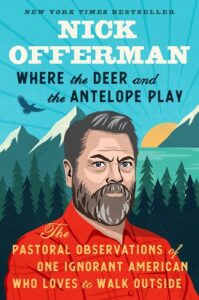
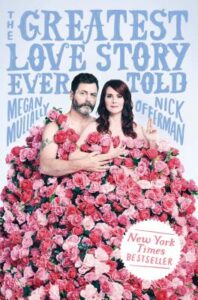
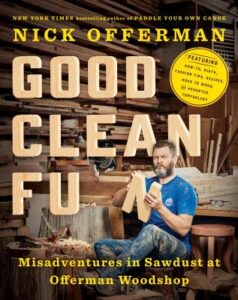
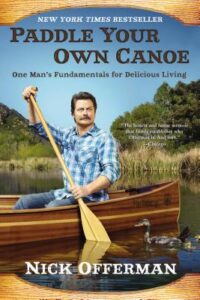
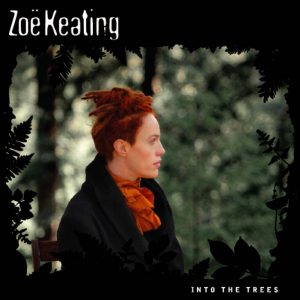

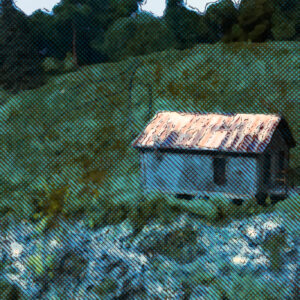
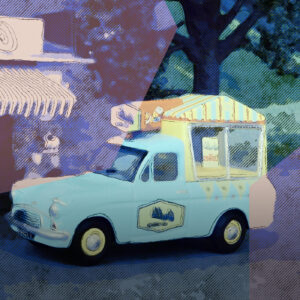

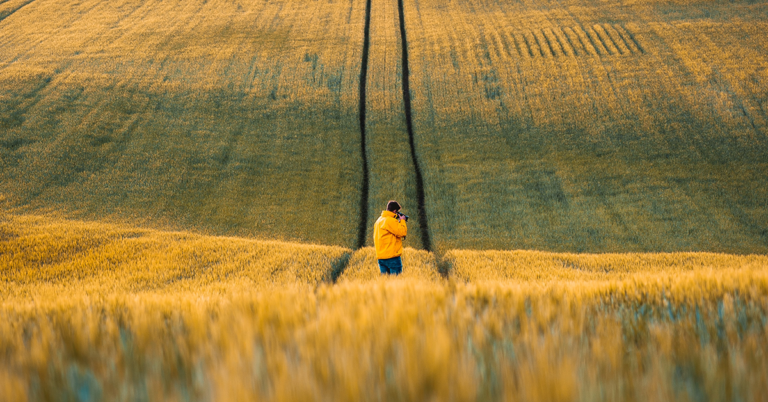
Reflections